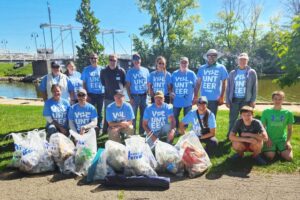State of Michigan sues Gerald R. Ford Airport Authority for PFAS pollution

By Lester Graham, Michigan Radio
The Great Lakes News Collaborative includes Bridge Michigan; Circle of Blue; Great Lakes Now at Detroit Public Television; and Michigan Radio, Michigan’s NPR News Leader; who work together to bring audiences news and information about the impact of climate change, pollution, and aging infrastructure on the Great Lakes and drinking water.
Great Lakes Now
https://www.greatlakesnow.org/2023/09/state-michigan-sues-gerald-r-ford-airport-authority-pfas-pollution/

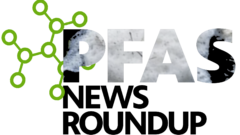
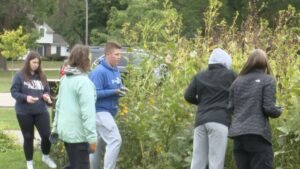
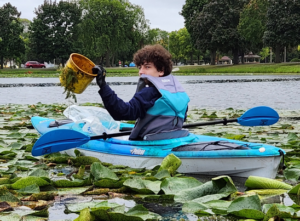 Reyer paddled alongside Oshkosh North High School students and staff cleaning up a total of 23 pounds of trash. Included in this total was one large cooking pot, a slimy yellow bucket, a fishing pole, and lots of plastic bags and wrappers.
Reyer paddled alongside Oshkosh North High School students and staff cleaning up a total of 23 pounds of trash. Included in this total was one large cooking pot, a slimy yellow bucket, a fishing pole, and lots of plastic bags and wrappers.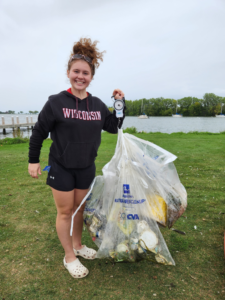
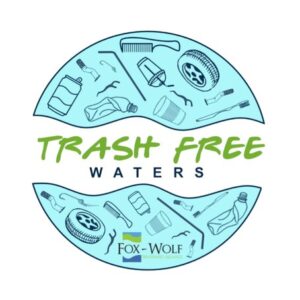
 kelly@fwwa.org
kelly@fwwa.org 920-915-1502
920-915-1502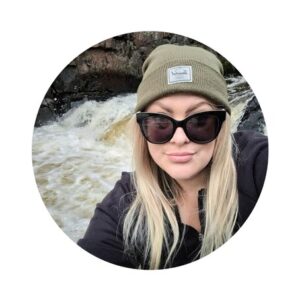
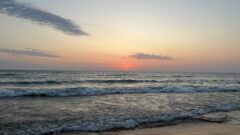

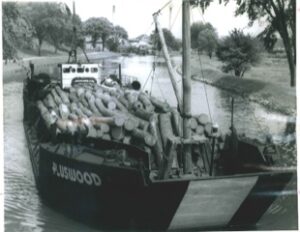 A boat built for combat was hauling logs from Canada on the lock system after WWII. According to an article in the Appleton Post Crescent from Sept 28, 1946, the PlusWood Company purchased such a craft. The LCT (Landing Craft -Tanks) was perhaps built for beach landings in Europe towards the end of WWII, but was never used in combat.
A boat built for combat was hauling logs from Canada on the lock system after WWII. According to an article in the Appleton Post Crescent from Sept 28, 1946, the PlusWood Company purchased such a craft. The LCT (Landing Craft -Tanks) was perhaps built for beach landings in Europe towards the end of WWII, but was never used in combat. 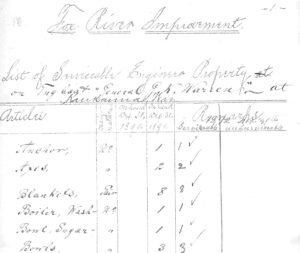 A few historical documents tell a story about the people working on these boats and what life on the river was like. A checklist of “Serviceable Engineer Property” was created when the General GK Warren tug was delivered to Kaukauna in 1892. The variety of items range from axes to blankets to sugar!
A few historical documents tell a story about the people working on these boats and what life on the river was like. A checklist of “Serviceable Engineer Property” was created when the General GK Warren tug was delivered to Kaukauna in 1892. The variety of items range from axes to blankets to sugar!
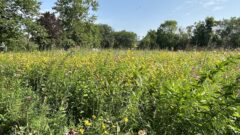









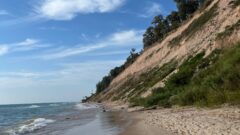
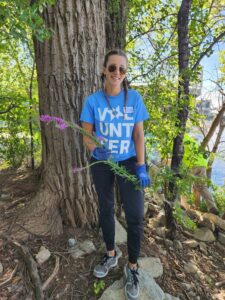 along the Fox River. Team-building events are a new opportunity offered by the Trash Free Waters program that strengthens employee relations, allow for employee connect outside the office, and makes an impact by protecting our water resources. The event took place on Wednesday, August 30th, will Foth volunteers meeting at Voyageur Park and learning about Fox-Wolf’s efforts in the basin. Aquatic Invasive Species (AIS) prevention coordinator, Chris Acy, discussed his work in the watershed, highlighting both nusiance plants and animals in the area, efforts to prevent the spread of invasive species, and
along the Fox River. Team-building events are a new opportunity offered by the Trash Free Waters program that strengthens employee relations, allow for employee connect outside the office, and makes an impact by protecting our water resources. The event took place on Wednesday, August 30th, will Foth volunteers meeting at Voyageur Park and learning about Fox-Wolf’s efforts in the basin. Aquatic Invasive Species (AIS) prevention coordinator, Chris Acy, discussed his work in the watershed, highlighting both nusiance plants and animals in the area, efforts to prevent the spread of invasive species, and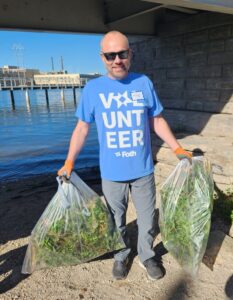 different ways volunteers can get involved in this work going forward. The group then traversed to the park’s south side fishing island to identify and properly remove more purple loosetrife plants along the banks of the Fox River. Foth volunteers worked in small teams and efficiently removed over 20 purple loosetrife plants!
different ways volunteers can get involved in this work going forward. The group then traversed to the park’s south side fishing island to identify and properly remove more purple loosetrife plants along the banks of the Fox River. Foth volunteers worked in small teams and efficiently removed over 20 purple loosetrife plants!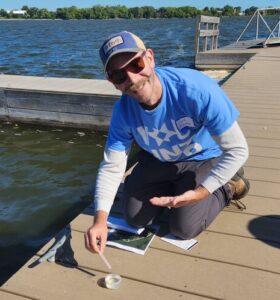 Watch program, and were given Salt Watch kits, containers, maps, and instructions for monitoring along the riverbank. Volunteers grabbed their water samples and used the Quantab test strips to get the chloride reading for their respective monitoring locations. The chloride results were all between 1.2 and 1.4 Quantab units, which is 31ppm(mg/L) or less. As expected, the chloride levels were relatively low as it was August and the Fox River is large which results in the dillution of chloride. Five Foth team members signed up to volunteer for the upcoming Salt Watch season.
Watch program, and were given Salt Watch kits, containers, maps, and instructions for monitoring along the riverbank. Volunteers grabbed their water samples and used the Quantab test strips to get the chloride reading for their respective monitoring locations. The chloride results were all between 1.2 and 1.4 Quantab units, which is 31ppm(mg/L) or less. As expected, the chloride levels were relatively low as it was August and the Fox River is large which results in the dillution of chloride. Five Foth team members signed up to volunteer for the upcoming Salt Watch season.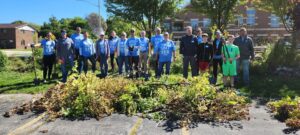
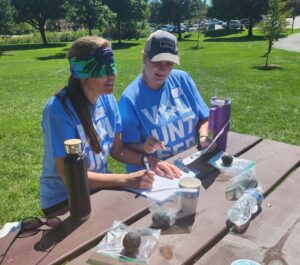 and given a pen and a clipboard with blank paper. The non-blindfolded team member was given an image of a skeleton key and had to use their communication skills to describe how to draw the image without saying what the image was. This activity produced a wide variety of drawings and lots of laughter. We discussed what methods of communication resulted in drawings that most closely matched the provided skeleton key image.
and given a pen and a clipboard with blank paper. The non-blindfolded team member was given an image of a skeleton key and had to use their communication skills to describe how to draw the image without saying what the image was. This activity produced a wide variety of drawings and lots of laughter. We discussed what methods of communication resulted in drawings that most closely matched the provided skeleton key image.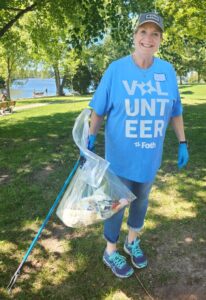 up the park and along the Fox River Recreation Trail for over two hours, and removed 116 pounds of trash! Specifically, the Foth crew cleaned up 22 bags of trash, 727 cigarette butts, 76 platic bags, and 38 straws. Additionally, three volunteers won awards for “heaviest haul”, “weirdest item found”, and “largest item found”. The Foth environmental team did an outstanding job of improving the park and protecting our waterways.
up the park and along the Fox River Recreation Trail for over two hours, and removed 116 pounds of trash! Specifically, the Foth crew cleaned up 22 bags of trash, 727 cigarette butts, 76 platic bags, and 38 straws. Additionally, three volunteers won awards for “heaviest haul”, “weirdest item found”, and “largest item found”. The Foth environmental team did an outstanding job of improving the park and protecting our waterways.